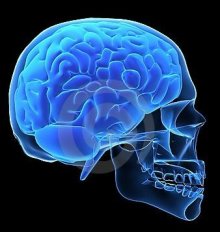 |
Thursday, 2 January 2014
Human brains are hard-wired to enjoy the calm of the countryside
Mood:
 cool
Topic: Brain cool
Topic: Brain

Many of us dream of escaping to the calm and tranquillity of the countryside, leaving the rat race behind - and it seems this may be due to the fact our brain is telling us to. Researchers from Exeter have discovered we are hard-wired to seek out rural landscapes because they make us feel calm, while cities confuse us and make us aggressive - even if we’ve only ever lived in urban areas. This could be due to the fact humans lived in rural environments for hundreds of years, or may be because our brains just aren’t equipped to handle the huge amounts of stimuli in busy cityscapes. To test their theory of rural versus urban living, scientists at Exeter University wired up participants to an MRI scanner before showing them images of cities and country landscapes. When rural images were flashed onto a screen, the limbic area of the brain was activated and lit up on the scanner. This area is associated with feelings of calm and peacefulness and is part of the brain shared with monkeys and primates. However, when images of cities and busy streets were shown to the participants, the area of the brain associated with ‘visual complexity’ - the visual cortex in the occipital lobe - was activated. This caused the brain to try and scan the image, make sense of everything it was seeing and process all the information, which can lead to confusion and anxiety. This was even the case when ‘dull’ rural images were shown leading the researchers to conclude its not just idyllic-looking places that cause this feeling of calm. These findings are just preliminary results shared with The Independent and the researchers plan to test the theory further to find out exactly why this happens. Read more: dailymail.co.uk
Posted by Neil Bartlett DHyp M.A.E.P.H
at 00:01 CET
Updated: Thursday, 2 January 2014 02:32 CET
Tuesday, 29 October 2013
Brain releases natural painkillers during social rejection
Mood:
 not sure
Topic: Brain not sure
Topic: Brain

“Sticks and stones may break my bones, but words will never hurt me,” goes the playground rhyme that’s supposed to help children endure taunts from classmates. But a new study suggests that there’s more going on inside our brains when someone snubs us – and that the brain may have its own way of easing social pain. The findings, recently published in Molecular Psychiatry by a University of Michigan Medical School team, show that the brain’s natural painkiller system responds to social rejection – not just physical injury. What’s more, people who score high on a personality trait called resilience – the ability to adjust to environmental change – had the highest amount of natural painkiller activation. The team, based at U-M’s Molecular and Behavioral Neuroscience Institute, used an innovative approach to make its findings. They combined advanced brain scanning that can track chemical release in the brain with a model of social rejection based on online dating. The work was funded by the U-M Depression Center, the Michigan Institute for Clinical and Health Research, the Brain & Behavior Research Foundation, the Phil F Jenkins Foundation, and the National Institutes of Health. They focused on the mu-opioid receptor system in the brain – the same system that the team has studied for years in relation to response to physical pain. Over more than a decade, U-M work has shown that when a person feels physical pain, their brains release chemicals called opioids into the space between neurons, dampening pain signals. Read more - scienceblog.com
Posted by Neil Bartlett DHyp M.A.E.P.H
at 00:01 MEST
Updated: Tuesday, 29 October 2013 02:02 MEST
Friday, 4 October 2013
Insomniacs brains lose focus, scans suggest
Mood:
 happy
Topic: Brain happy
Topic: Brain

Brain scans of people who say they have insomnia have shown differences in brain function compared with people who get a full night's sleep. Researchers at the University of California, San Diego, said the poor sleepers struggled to focus part of their brain in memory tests. Other experts said that the brain's wiring may actually be affecting perceptions of sleep quality. The findings were published in the journal Sleep. People with insomnia struggle to sleep at night, but it also has consequences during the day such as delayed reaction times and memory. The study compared 25 people who said they had insomnia with 25 who described themselves as good sleepers. MRI brain scans were carried out while they performed increasingly challenging memory tests. One of the researchers, Prof Sean Drummond, said: "We found that insomnia subjects did not properly turn on brain regions critical to a working memory task and did not turn off 'mind-wandering' brain regions irrelevant to the task. "This data helps us understand that people with insomnia not only have trouble sleeping at night, but their brains are not functioning as efficiently during the day." A sleep researcher in the UK, Dr Neil Stanley, said that the quality of the sleep each group was having was very similar, even though one set was reporting insomnia. He said: "What's the chicken and what's the egg? Is the brain different and causing them to report worse sleep? "Maybe they're perceiving what happened in the night differently; maybe what is affecting their working memory and ability to focus on the task at hand is also causing insomnia." Source - BBC
Posted by Neil Bartlett DHyp M.A.E.P.H
at 00:01 MEST
Updated: Friday, 4 October 2013 01:07 MEST
Saturday, 28 September 2013
Sara Lazar on how meditation can reshape our Brains
Mood:
 lyrical
Topic: Brain lyrical
Topic: Brain
Neuroscientist Sara Lazar's amazing brain scans show meditation can actually change the size of key regions of our brain, improving our memory and making us more empathetic, compassionate, and resilient under stress.
Posted by Neil Bartlett DHyp M.A.E.P.H
at 10:54 MEST
Updated: Saturday, 28 September 2013 10:55 MEST
Sunday, 25 August 2013
Exercise reorganizes the brain to be more resilient to stress
Mood:
 bright
Topic: Brain bright
Topic: Brain

Physical activity reorganizes the brain so that its response to stress is reduced and anxiety is less likely to interfere with normal brain function, according to a research team based at Princeton University. The researchers report in the Journal of Neuroscience that when mice allowed to exercise regularly experienced a stressor — exposure to cold water — their brains exhibited a spike in the activity of neurons that shut off excitement in the ventral hippocampus, a brain region shown to regulate anxiety. These findings potentially resolve a discrepancy in research related to the effect of exercise on the brain — namely that exercise reduces anxiety while also promoting the growth of new neurons in the ventral hippocampus. Because these young neurons are typically more excitable than their more mature counterparts, exercise should result in more anxiety, not less. The Princeton-led researchers, however, found that exercise also strengthens the mechanisms that prevent these brain cells from firing. The impact of physical activity on the ventral hippocampus specifically has not been deeply explored, said senior author Elizabeth Gould, Princeton's Dorman T. Warren Professor of Psychology. By doing so, members of Gould's laboratory pinpointed brain cells and regions important to anxiety regulation that may help scientists better understand and treat human anxiety disorders, she said. From an evolutionary standpoint, the research also shows that the brain can be extremely adaptive and tailor its own processes to an organism's lifestyle or surroundings, Gould said. A higher likelihood of anxious behavior may have an adaptive advantage for less physically fit creatures. Anxiety often manifests itself in avoidant behavior and avoiding potentially dangerous situations would increase the likelihood of survival, particularly for those less capable of responding with a "fight or flight" reaction, she said. "Understanding how the brain regulates anxious behavior gives us potential clues about helping people with anxiety disorders. It also tells us something about how the brain modifies itself to respond optimally to its own environment," said Gould, who also is a professor in the Princeton Neuroscience Institute. Read More - eurekalert.org
Posted by Neil Bartlett DHyp M.A.E.P.H
at 00:01 MEST
Updated: Sunday, 25 August 2013 01:21 MEST
Friday, 1 March 2013
What evil lurks in the brain?
Mood:
 d'oh
Topic: Brain d'oh
Topic: Brain

After studying the brains of violent killers, rapists and robbers, German neurologist Gerhard Roth claims to have found a “dark patch” in the center of the brain -- he calls it the evil spot, a genetic source of violent behavior. Roth, a professor at the University of Bremen, told Germany news site Bild.de that he had shown short films to criminals and measured their brain activity. A small section at the front of their brains showed no reaction to violent scenes; it remained "dark" when shown dark scenes. "Whenever there were brutal and squalid scenes, the subjects showed no emotions. In the areas of the brain where we create compassion and sorrow, nothing happened,” Roth said. BioEdge, a blog dedicated to bioethics news, translated Roth's German into English: “This is definitely the region of the brain where evil is formed and where it lurks.” Read more: foxnews.com
Posted by Neil Bartlett DHyp M.A.E.P.H
at 01:01 CET
Updated: Friday, 1 March 2013 01:12 CET
Saturday, 8 December 2012
Making Music Together Connects Brains
Mood:
 happy
Topic: Brain happy
Topic: Brain

Anyone who has ever played in an orchestra will be familiar with the phenomenon: the impulse for one's own actions does not seem to come from one's own mind alone, but rather seems to be controlled by the coordinated activity of the group. And indeed, interbrain networks do emerge when making music together -- this has now been demonstrated by scientists from the Max Planck Institute for Human Development in Berlin. The scientists used electrodes to trace the brain waves of guitarists playing in duets. They also observed substantial differences in the musicians' brain activity, depending upon whether musicians were leading or following their companion. When guitarists play a duet, the activity of their brain waves synchronises. Scientists working with Ulman Lindenberger at the Max Planck Institute for Human Development in Berlin had already discovered this in 2009. Now they have gone one step further, examining the brain activity of various pairs of guitar players performing a piece of music with two different parts. Their aim was to find out whether synchronisation of the brain waves would still occur when two guitarists are not playing exactly the same notes. Full Story from - sciencedaily.com
Posted by Neil Bartlett DHyp M.A.E.P.H
at 01:01 CET
Updated: Thursday, 13 December 2012 09:32 CET
Tuesday, 27 November 2012
Smoking rots brain, says King's College study
Mood:
 a-ok
Topic: Brain a-ok
Topic: Brain

Smoking "rots" the brain by damaging memory, learning and reasoning, according to researchers at King's College London. A study of 8,800 people over 50 showed high blood pressure and being overweight also seemed to affect the brain, but to a lesser extent. Scientists involved said people needed to be aware that lifestyles could damage the mind as well as the body. Their study was published in the journal Age and Ageing. Researchers at King's were investigating links between the likelihood of a heart attack or stroke and the state of the brain. Data about the health and lifestyle of a group of over-50s was collected and brain tests, such as making participants learn new words or name as many animals as they could in a minute, were also performed. They were all tested again after four and then eight years. Full Story from BBC
Posted by Neil Bartlett DHyp M.A.E.P.H
at 01:01 CET
Updated: Tuesday, 27 November 2012 01:19 CET
Saturday, 17 November 2012
Annoying people slow down your brain
Mood:
 chatty
Topic: Brain chatty
Topic: Brain

It’s irritating enough being around someone you don’t like. Now, to make matters worse, scientists have discovered that bad company could also affect your brain. Whether you like someone or not can affect how your brain processes their actions, according to new research from the University of Southern California. Most of the time, watching someone else move causes a ‘mirroring’ effect — that is, the parts of our brains responsible for movement are activated by watching someone else in action. But being around someone you don’t like can send this process awry – you might think the person is moving more slowly than they actually are, for example. Past research has shown that race or physical similarity can influence brain processes, and we tend to have more empathy for people who look more like us. Full Story from dailymail.co.uk
Posted by Neil Bartlett DHyp M.A.E.P.H
at 01:01 CET
Updated: Saturday, 17 November 2012 02:16 CET
Tuesday, 19 June 2012
Greater Purpose in Life May Protect Against Alzheimers
Mood:
 celebratory
Topic: Brain celebratory
Topic: Brain

Greater purpose in life may help stave off the harmful effects of plaques and tangles associated with Alzheimer's disease, according to a new study by researchers at Rush University Medical Center. The study is published in the May issue of the Archives of General Psychiatry. "Our study showed that people who reported greater purpose in life exhibited better cognition than those with less purpose in life even as plaques and tangles accumulated in their brains," said Patricia A. Boyle, PhD. "These findings suggest that purpose in life protects against the harmful effects of plaques and tangles on memory and other thinking abilities. Full Story from sciencedaily.com
Posted by Neil Bartlett DHyp M.A.E.P.H
at 01:01 MEST
Updated: Tuesday, 19 June 2012 02:03 MEST
Newer | Latest | Older
|
| « |
April 2024 |
» |
 |
| S |
M |
T |
W |
T |
F |
S |
|
1 |
2 |
3 |
4 |
5 |
6 |
| 7 |
8 |
9 |
10 |
11 |
12 |
13 |
| 14 |
15 |
16 |
17 |
18 |
19 |
20 |
| 21 |
22 |
23 |
24 |
25 |
26 |
27 |
| 28 |
29 |
30 |
|










